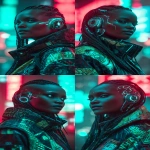Explore the Best AI Image Gallery

Transforming Product Photography: The Role of AI in Creative Imagery
In a world dominated by online shopping, visual content has become a crucial factor in consumer decision-making. Product photography plays a significant role in enticing customers and showcasing products in the best light possible. With the advent of artificial intelligence (AI), the landscape of product photography is witnessing unprecedented transformation. This blog post delves into the impact of AI on product photography, its applications, ethical considerations, and future directions.
The Impact of AI on Product Photography
AI technologies, like machine learning and computer vision, are revolutionizing how product images are captured, processed, and presented. AI-powered tools effectively analyze vast datasets of images, understanding trends, customer preferences, and visual aesthetics. This ability to learn from extensive datasets has led to innovations that not only enhance the quality of product imagery but also streamline workflow processes.
Enhancement of Creative Processes
AI tools, such as Adobe Photoshop and Luminar AI, offer features that automate tedious editing tasks including background removal, color correction, and image enhancement. By taking care of these repetitive actions, photographers can focus more on the creative aspects of their work. Additionally, AI can generate realistic synthetic images, allowing brands to visualize products in various contexts without the need for costly photo shoots.
- Background Removal: AI can effortlessly remove backgrounds from images, allowing for cleaner and more professionally polished results.
- Color Adjustment: AI algorithms can analyze images and suggest color corrections or enhancements that align with current trends.
- Synthetic Imagery: AI can create realistic images of products in diverse settings, saving time and resources.
Potential Uses of AI in Product Photography
AI's impact on product photography goes beyond just image editing. Here are some notable applications:
Automated Image Tagging
AI algorithms can analyze product images and automate the tagging process, making it easier for businesses to categorize and manage their photography archives. This capability is invaluable, especially for large retailers with extensive inventories.
Virtual Try-Ons
AI technology enables virtual try-ons for products like clothing, accessories, or makeup. These applications allow consumers to visualize how a product would look on them, enhancing the online shopping experience and reducing return rates.
Personalized Recommendations
By analyzing user data and visual preferences, AI can suggest tailored products to customers, transforming the shopping experience into a more personalized journey that heightens engagement and conversion rates.
Ethical Considerations Associated with AI in Photography
While the benefits of AI in product photography are profound, they also raise several ethical concerns:
- Authenticity: As AI-generated images become more commonplace, questions arise about the authenticity of product representation. Customers may feel misled if products appear different in real life compared to their images.
- Job Displacement: The automation of tasks traditionally performed by photographers poses concerns about job loss in the creative sector.
- Intellectual Property: The use of AI technologies in photography introduces complexities surrounding copyright and ownership of digitally created images.
Future Trends in AI-Driven Product Photography
The future of AI in product photography is teeming with possibilities. Here are some anticipated trends:
Increased Integration of AI in Workflows
As AI technology continues to evolve, its integration into creative workflows will expand. Expect more seamless connections between photography software and AI tools, encouraging more creative experimentation.
Real-Time Editing and Customization
Real-time editing capabilities powered by AI will allow photographers to adjust settings on-the-fly, enabling greater flexibility during shoots and leading to more dynamic imagery.
Ethical AI Technologies
The future will likely see a push towards ethical AI technologies that prioritize transparency and user consent in data use. Stakeholders in the creative industry will need to navigate these complexities to maintain consumer trust.
Conclusion
AI's emergence in product photography signals a new era marked by enhanced creativity, efficiency, and ethical contemplation. Embracing these tools offers immense potential for photographers and brands alike, revolutionizing how we attract and engage customers. As we move forward, balancing innovation with ethical responsibility will be key in shaping the future of photography.
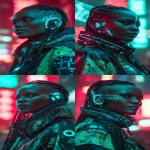








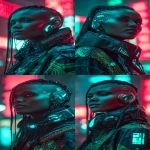

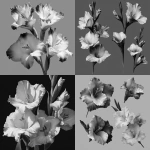





](https://images.ai-img.art/thumbnails/150/0791636c23fa42b3fd87dbe2541b7d3047cdb4d5fc0dab19f4efcfe1439963da.webp)
](https://images.ai-img.art/thumbnails/150/6b15b97ffd39aeb1b066fd2c8b33c1a2dd03a3966282ec6508e2c2c205c0360f.webp)






](https://images.ai-img.art/thumbnails/150/08baaaca8d12502f281846feba6b0cf89edf106843ff56346812f5eec39eeed1.webp)










](https://images.ai-img.art/thumbnails/150/916a8f2aa9c13d051af4ab588a4921732f41e144150bdfc78853a28500cd717d.webp)

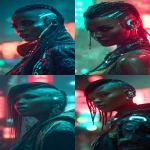
](https://images.ai-img.art/thumbnails/150/477a6a01318cd965f7f5f6ecc623f70e7e61f0004811369ce0977db761aecd57.webp)

](https://images.ai-img.art/thumbnails/150/ffdc3aeb085cdd89cb67916c26208f25e7c7b0250ad6e5877b48414760697a90.webp)






